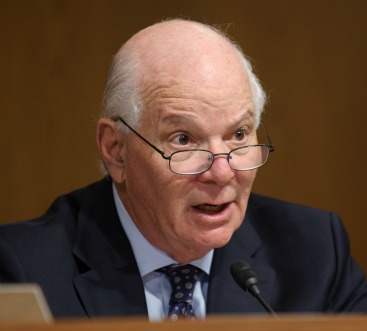Mr. President, in 1991, then-Czechoslovak President Vaclav Havel brought together his counterparts from Poland and Hungary. Taking inspiration from a 14th century meeting of Central European kings, these 20th century leaders returned to the same Danube town of Visegrad with a view to eliminating the remnants of the communist bloc in Central Europe; overcoming historic animosities between Central European countries; and promoting European integration.
Today, the Czech Republic, Hungary, Poland and Slovakia are together known as the Visegrad Group, and all four have successfully joined NATO and the European Union. They are anchors in the Trans-Atlantic alliance, and I am pleased to have had the opportunity to travel to all four of these countries where I have met with public officials, non-governmental representatives and ethnic and religious community leaders.
Unfortunately, it appears that some additional work is necessary to address one of the principal goals of the Visegrad Group; namely, overcoming historic animosities. In recent months, relations between Hungary and Slovakia have been strained. Having traveled in the region and having met with leaders from both countries during their recent visits to Washington, I would like to share a few observations.
First, an amendment to the Slovak language law, which was adopted in June and will enter into force in January, has caused a great deal of concern that the use of the Hungarian language by the Hungarian minority in Slovakia will be unduly or unfairly restricted. Unfortunately, that anxiety has been whipped up, in part, by a number of inaccurate and exaggerated statements about the law.
The amendment to the state language law only governs the use of the state language by official public bodies. These state entities may be fined if they fail to ensure that Slovak–the state language–is used in addition to the minority languages permitted by law. The amendment does not allow fines to be imposed on individuals, and certainly not for speaking Hungarian or any other minority language in private, contrary to what is sometimes implied.
The OSCE High Commissioner on National Minorities has been meeting with officials from both countries and summarized the Slovak law in his most recent report to the OSCE Permanent Council:
“The adopted amendments to the State Language Law pursue a legitimate aim, namely, to strengthen the position of the State language, and, overall, are in line with international standards. Some parts of the law, however, are ambiguous and may be misinterpreted, leading to a negative impact on the rights of persons belonging to national minorities.”
Since the law has not yet come into effect, there is particular concern that even if the law itself is consistent with international norms, the implementation of the law may not be.
I am heartened that Slovakia and Hungary have continued to engage with one of the OSCE’s most respected institutions–the High Commissioner on National Minorities–on this sensitive issue, and I am confident that their continued discussions will be constructive.
At the same time, I would flag a number of factors or developments that have created the impression that the Slovak Government has some hostility toward the Hungarian minority.
Those factors include but are not limited to the participation of the extremist Slovak National Party, SNS, in the government itself; the SNS control of the Ministry of Education, one of the most sensitive ministries for ethnic minorities; the Ministry of Education’s previous position that it would require Slovak-language place names in Hungarian language textbooks; the handling of the investigation into the 2006 Hedvig Malinova case in a manner that makes it impossible to have confidence in the results of the investigation, and subsequent threats to charge Ms. Malinova with perjury; and the adoption of a resolution by the parliament honoring Andrei Hlinka, notwithstanding his notorious and noxious anti-Hungarian, anti-Semitic, and anti-Roma positions.
All that said, developments in Hungary have done little to calm the waters. Hungary itself has been gripped by a frightening rise in extremism, manifested by statements and actions of the Hungarian Guard, the “64 Counties” movement, and the extremist party Jobbik, all of which are known for their irredentist, anti-Semitic, and anti-Roma postures. Murders and other violent attacks against Roma, repeated attacks by vandals on the Slovak Institute in Budapest, attacks on property in Budapest’s Jewish quarter in September, and demonstrations which have blocked the border with Slovakia and where the Slovak flag is burned illustrate the extent to which the Hungarian social fabric is being tested.
Not coincidentally, both Hungary and Slovakia have parliamentary elections next year, in April and June respectively, and, under those circumstances, it may suit extremist elements in both countries just fine to have these sorts of developments: nationalists in Slovakia can pretend to be protecting Slovakia’s language and culture–indeed, the very state–from the dangerous overreach of Hungarians. Hungarian nationalists–on both sides of the border–can pretend that Hungarian minorities require their singular protection–best achieved by remembering them come election day. Meanwhile, the vast majority of good-natured Slovaks and Hungarians, who have gotten along rather well for most of the last decade, may find their better natures overshadowed by the words and deeds of a vocal few.
In meetings with Slovak and Hungarian officials alike, I have urged my colleagues to be particularly mindful of the need for restraint in this pre-election season, and I have welcomed the efforts of those individuals who have chosen thoughtful engagement over mindless provocation. I hope both countries will continue their engagement with the OSCE High Commissioner on National Minorities, whom I believe can play a constructive role in addressing minority and other bilateral concerns.










